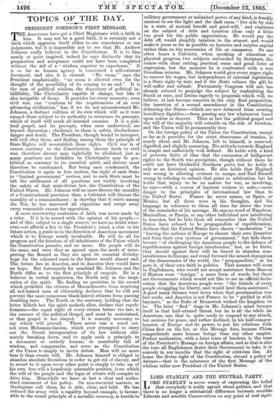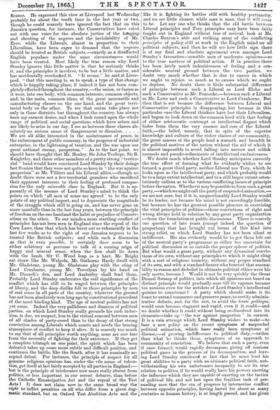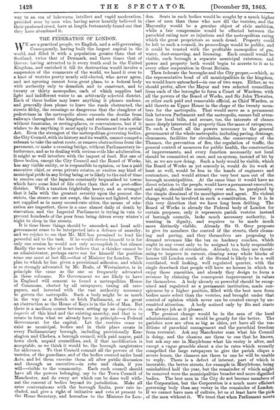LORD STANLEY AND THE , NEUTRAL PARTY.
LORD STANLEY is never weary of expressing the belief that everybody is really agreed about politics, and that there is no longer a substantial difference between sensible Liberals and sensible Conservatives on any point of real signi-
ficance. He expressed this view at Liverpool last Wednesday probably for about the tenth time in the last year or two, though he could scarcely have ignored the fact that on this Jamaica question, for instance, the Conservatives have cried out with one voice for the absolute justice of the hinging and shooting of the negroes and the inviolability of Mr. Eyre, while the Liberals, almost in proportion to their Liberalism, have been eager to demand that the negroes should be treated as British subjects,—exactly as a disaffected English populace under the same circumstances would have been treated. Most likely the true reason why Lord 'Stanley ignores this little matter is that he seriously thinks it, and the principles it involves, to be but a little matter, and 'has accidentally overlooked it. "It seems," he said at Liver- pool, " that this meeting is, so to speak, a type of that change which is happily taking place, if indeed it has not been com- pletely effectedthroughout the country,—the union, or fusion as it were, into one body, with common interests, common objects, -and, in the main, common ideas, of the great mercantile and inanufacturing classes on the one hand, and the great terri- torial body on the other. To see that union take place not only in these districts, but throughout .the country, has always been my earnest desire, and when I look round upon the whole range of political and social questions which have arisen and are likely to arise in our day, I see as between these classes ab-
solutely no serious cause of disagreement or disunion We are all alike interested in the maintenance of peace, in . the enforcement of public economy, in the progress of industrial enterprise, in the lightening of taxation, and the war upon our great national enemy, pauperism." As to the last point, we should have thought that Mr. Henley, Sir John Trollope, Sir R. Knightley, and those other members of a pretty strong "territo- rial " band would have convinced Lord Stanley by their doings last Session that they were not quite so keen in " the war against pauperism" as Mr. Villiers and his Liberal allies,—though no doubt there were not a few territorial grandees who sacrificed their apparent interests to their feeling of profound compas- sion for the only miserable class in England. But it is ap- parently of the essence of Lord Stanley's mind to think the points on which all men of sense are agreed' to be the only points of any political import, and to depreciate the magnitude of the struggle which still is going on, and has never gone on -more manfully than in the last four years, between the principle of freedom on the one hand and the habit or prejudice of Conserv- atism on the other. To our minds a more startling conflict of principles has not been seen in England since the repeal of the Corn Laws, than that which has burst out so vehemently in the last few weeks as to the right of our Jamaica negroes to be -treated like British subjects ; and while such a discussion as that is even possible, it certainly does seem to be either arbitrary or perverse to talk of a coming reign of happy and neutral sense, when the lion shall lie down with the lamb, Sir C. Wood leap as a hart, Mr. Bright eat straw like Mr. Walpole, Mr. G-athorne Hardy dwell with Mr. Gladstone, young Mr. Gladstone play with the sting of 'Lord Cranborne, young Mr. Trevelyan lay his hand on 1dr. Disraeli's den, and Lord Amberley shall lead them. Probably Lord Stanley underrates the real significance of the conflict which has still to be waged between the principles IA liberty, and the deep dislike felt to those principles by men of real sense in all parts of the country, wherever the ground has not been absolutely won long ago by constitutional precedent of the most binding kind. The age of neutral politics has not yet come. Indeed the very pallidness and dimness of political parties, on which Lord Stanley really grounds his rash induc- tion, is due, we suspect, less to the virtual concord between men of all shades of party-creed than to the decay of that strong conviction among Liberals which courts and needs the bracing atmosphere of conflict to keep it alive. It is scarcely too much to say that of all principles worth anything, none are ever free from the necessity of fighting for their existence. If they get a complete triumph on one point, the, spirit which has been defeated takes up some more subtle and difficult position, and continues the battle, like the South, after it has nominally ac- cepted defeat. For instance, the principle of respect for all genuine religious opinions has, under the vile name of tolera- tion, got itself at last fairly accepted by all parties in England; but is the principle of intolerance now more really absent from politics, or less important in our recent, debates, than before the Catholic' Emancipation Act and the repeal of the Test Acts I It does not claim now in the same broad way the right to inflict penalties on all who differ from a given dog- matic standard, but on Oxford Test Abolition Acts and the like it is fighting its battles still with healthy pertinacity, and we see little chance, while man is man, that it will cease to be. Let any one who thinks that the old battle between Liberal principles and Tory principles may have been fairly fought out in England without fear of revival, look at Mr. Charles Buxton's able and striking array of the conflicting principles of policy still at work in the English mind on all political subjects, and then he will see how little sign there is of any final and absolute agreement even amongst Lord Stanley's favourites—sensible men of moderate opinions—as to the true motives of political action. If in practice there has been lately much indecisiveness of feeling and a con- siderable neutral ground between the two parties, we doubt very much whether that is due to causes in which we ought to rejoice, so much as to causes which we ought to deplore. No doubt there is little substantial difference of principle between such a Liberal as Lord Elcho and such a Conservative as Mr. Peacocke,—between such Et Liberal as Mr. Lowe and such a Conservative as Lord Cranborne. But then that is not because the difference between Liberal and Conservative principles is disappearing, but because in this particular case the Liberal thinkers have lost their Liberalism, and begun to look down on the common herd with that feeling of either aristocratic contempt or intellectual disgust which hides from them the very essence and core of the Liberal faith,—the belief, namely, that in spite of the superior knowledge and culture of the richer classes of our community, the great masses of the people lend a warmth and breadth to the political motives of the nation without the aid of which it is almost impossible to avoid falling into narrow and selfish counsels and pseudo-refinements of intellectual exclusiveness.
We doubt much whether Lord Stanley anticipates correctly the true effect of forming what he evidently wishes to see formed, a great third party, neither Liberal nor Tory, which he looks upon as the intellectual party, and which probably would be to a large extent intellectual, and to a still larger extent osten- tatiously callous as to the various conflicting issues of principle before the nation. Whetherit may be possible to form such a great party,—which we might call the party of suspended animation,— we are not sure, but if it is, unquestionably Lord Stanley would be its leader, not because his mind is not exceedingly forcible, but because he has the greatest possible pleasure in exorcising the vital principles of politics—those convictions of right and wrong always held in solution by any great party organization —from the foundation of public discussions. There is scarcely one question of late years (except indeed the question of pauperism) that has brought out issues of this kind into strong relief, on which Lord Stanley has not been silent or indifferent. His aim evidently would be to get them left out of the neutral party's programme as either too uncertain for political discussion or as outside the proper sphere of politics. But what would a great party, without any dynamical convic- tions of its own, without any principles to which it might cling with a sort of religious tenacity, without any proper standard of its own, and with a standard-bearer who boasted that amena- bility to reason and disbelief in ultimate political ethics were his only motto, become ? Would it not be very quickly the Great Dismal Swamp of politics, into which all opinions not based on distinct principle would gradually ooze till its vapours became too noxious even for the antidote of Lord Stanley's intellectual quinine to counteracts A party which should make it its boast to extend commerce and preserve peace, to rectify admin. is- trative defects, and, for the rest, to avoid the haute politique, would soon become stagnant and vapid, even if it could—and we doubt whether it could without being re-dissolved into its elements—take up " the war against pauperism " in earnest. It is a vain attempt which Lord Stanley wishes to make—to base a new policy on the recent symptoms of suspended political animation, which have really been symptoms of disease,—of growing indifference to political duty,—rather than what he thinks them, symptoms of an approach to community of conviction. We believe that such a party, even if once formed, would rapidly decompose, giving off noxious political gases in the process of its decomposition, and leav- ing Lord Stanley convinces at last that he must lend his great abilities to a party with an ultimate political faith, not- withstanding his own unfortunate incapacity to see its true relation to politics, if he would really have his powers exerting the influence which they are capable of exerting on the tactics of political life, and not lost upon the fruitless task of per- suading men that the era of progress by internecine conflict between opposite principles, having lasted for about as many centuries as human history, is at length passed, and has given
way to an era of lukewarm intellect and vapid moderation, presided over by men who, having never heartily believed in their professed creed, have at length fortunately found out that they have abandoned it.




































 Previous page
Previous page